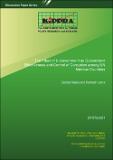| dc.date.accessioned | 2022-10-06T08:24:04Z | |
| dc.date.available | 2022-10-06T08:24:04Z | |
| dc.date.issued | 2021 | |
| dc.identifier.uri | https://repository.kippra.or.ke/handle/123456789/3866 | |
| dc.description.abstract | E-government has been implemented by various countries with the aim to
improve public sector efficiency through better service delivery, increased
accountability and improved interaction between the government, citizens
and businesses. E-participation increases the scope of e-government to include
information sharing, collaborative decision-making and participatory service
delivery. Both e-government and e-participation have numerous benefits, among
them the potential to improve public services and control corruption. This is
particularly important given that corruption is one of the most persistent and
prevalent challenges to socio-economic development and quality public service.
This study sought to assess the status of e-government and e-participation in
Kenya and compare it with aspirator countries to identify areas of weakness,
opportunities and lessons. It also determined the effect of e-government on
control of corruption among high income countries, upper middle-income
countries and lower middle-income countries. The results show that Kenya’s
score on the telecommunication infrastructure index was the lowest when
compared to aspirator countries. The study suggested areas that Kenya could
learn on e-government and e-participation in aspirator countries. Particularly,
the possibility of exploring context-specific e-government initiatives such
as SMS-based e-participation and mobile-based e-services was elucidated.
E-government development index and E-participation index were found to have
positive effects on government effectiveness and control of corruption among
the three categories of countries. However, the effects were significant for highincome
countries and upper middle-income countries that had higher average
scores for the components of e-government development index. Therefore,
lower-middle income countries such as Kenya need to continue investing on
e-government and e-participation to increase their government effectiveness
and control of corruption. | en |
| dc.language.iso | en | en |
| dc.publisher | The Kenya Institute for Public Policy Research and Analysis (KIPPRA) | en |
| dc.relation.ispartofseries | DP/270/2021 | |
| dc.subject | Service Delivery | en |
| dc.subject | Corruption | en |
| dc.subject | United Nations | en |
| dc.subject | E-Participation | en |
| dc.subject | E-Government | en |
| dc.title | Discussion Paper No. 270 of 2021 on The Effect of E-Government on Government Effectiveness and Control of Corruption among UN Member Countries | en |
| ppr.contributor.author | Naeku, Cecilia & Juma, Kenneth | |

